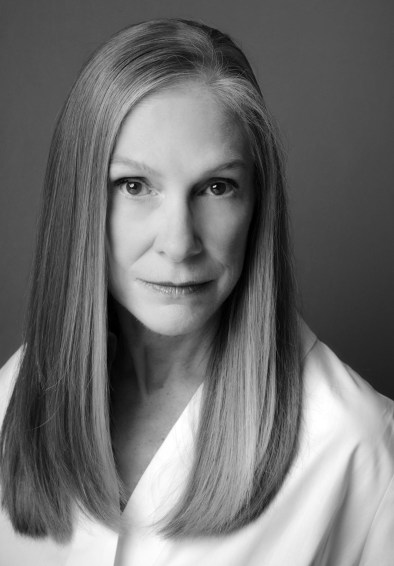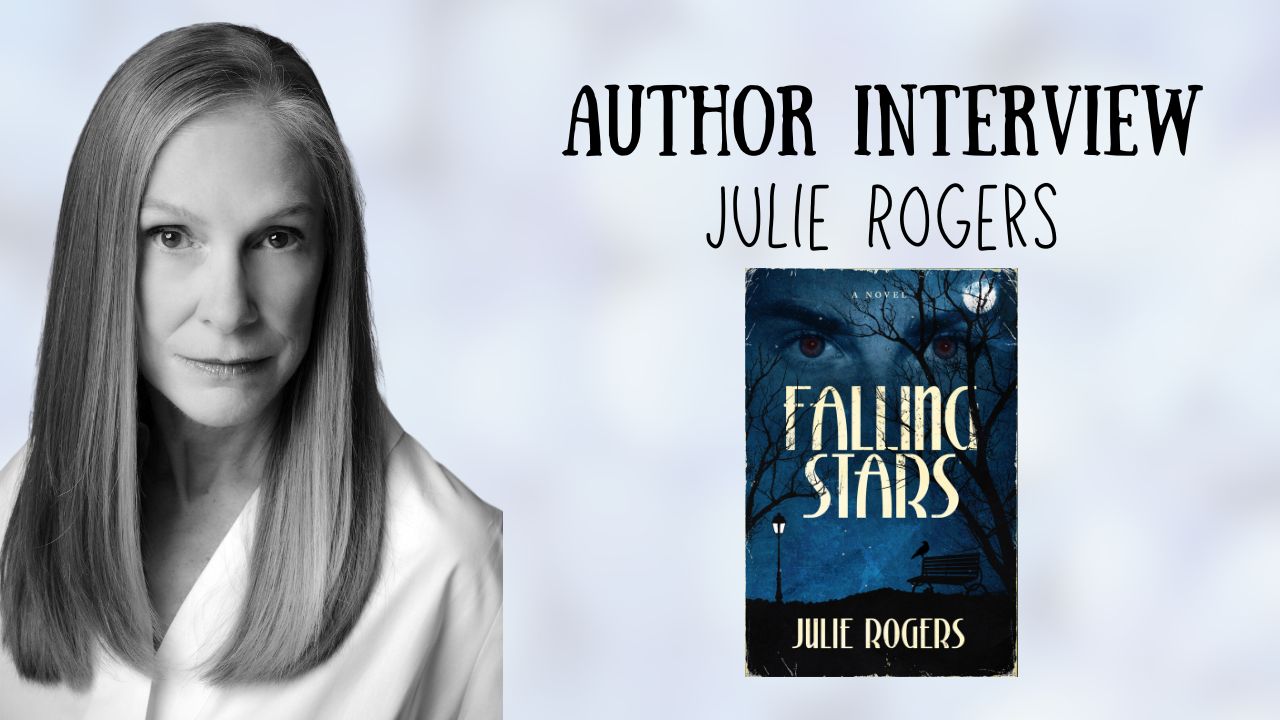As an Amazon Associate I earn from qualifying purchases.
On The Table Read Magazine, “the best book magazine in the UK“, author Julie Rogers shares what inspired her to write her new urban fantasy book, Falling Stars, and her creative writing process.
 Written by JJ Barnes
Written by JJ Barnes
I interviewed Julie Rogers about her life and career, the story of her latest book, Falling Stars, and what inspired her to write it.
Tell me a bit about who you are.
I’m Julie Rogers. I’ve written since high school, studied Journalism in college, and received a degree from Southern Methodist University in Dallas. I’m a freelance ghostwriter and editor going on ten years now. I started freelancing with Upwork and James Innes Group and have recently signed with Edioak in New York City. I also ghostwrite and edit for clients who contact me through my own company, julierogersbooks.com.

I enjoy working with first-time indie authors as a one-stop shop, helping them publish quality books and avoid costly missteps. I have seven books of my own, my latest (urban fantasy, FALLING STARS) was published on May 16, 2023.
When did you first WANT to write a book?
I won a themed essay competition in high school which fueled the fire.
When did you take a step to start writing?
I wrote some contributing articles for newspapers and magazines while in high school and college. After I graduated, my day job was an athletic trainer and writing was the side hustle.
How long did it take you to complete your first book from the first idea to release?
I wrote the original concepts and tons of notes for that book ten years before I actually started writing. The writing/editing process itself was two years.
How long did it take you to complete your latest book from the first idea to release?
Muahaha—now there’s a scary idea that might even predate some of your subscribers. Twenty-two years.
Focusing on your latest release. What made you want to write Falling Stars?
When I was ten, I had a friend, a boy in my third-grade class who was an avid fan of the TV cult classic Dark Shadows. He hurried home every day after school to watch it. This was in the daytime soap’s heyday after Canadian actor Jonathan Frid joined the show and its ratings went through the roof.
This little boy, my classmate, could pass for a vampire himself—the complete package with the dark hair and eyes, the long cuspids—and his ability to act the part. He had a flashy cape too, not just any old cheap one, with which he regularly entertained our classroom performing Barnabas Collins impersonations. I was curious about Dark Shadows, but my parents censored that one for me at the time because they thought the show would frighten me. And they were probably right.
Years later I revisited the memory, this little boy’s whole live action role-playing in third grade, really before LARPing was a thing. He did it because he loved the TV show, and his theatrics were fun-and-games when school got boring. But it posed a question to me: What if a young boy roleplayed a vampire for a much more serious reason, and where would that take him?
What were your biggest challenges with writing Falling Stars?
I’d written a few op-ed and inspirational pieces about people recovering from or succumbing to cancer, but I wasn’t sure I could pull off a story where the arch-nemesis was cancer and cancer treatment. I also knew I couldn’t exclude the courage, humor, and insight I’d observed in those very same people. I outlined the story after my maternal grandmother passed away from melanoma and pitched it as a screenplay treatment at the Maui Writers’ Convention in 2001 to Alison Rosenzweig, one of the producers of Windtalkers. She didn’t go for it, so I put the story away with all the other pitches that weren’t greenlighted at the time.
The original screenplay version had a YA or PG feel to it because I put the major focus on Tommy Lucas. In a novel, though, I had more room to weave in some incredible Eureka Springs’ and WWII history, as well as the whole Viscount Claudius Fallon persona, this vampire-human hybrid who struggles with his own disease process, and how he integrates a successful art gallery in the middle of a tourist destination without being discovered. I also realized I was the wrong person writing this in the wrong way in 2001.
Who or what inspired you when creating your Protagonist?
I’d say my own offbeat inner child who believes magic is as real as the next thing.
Who or what inspired you when creating your Antagonist?

My father lost a five-year battle with multiple myeloma in 2018, and Mom, adrift without him, died during the pandemic. I didn’t write for a year. Grief is a funny thing. One day the switch simply clicked back on and I pulled the project out of the closet, but with the intention of writing it as a novel. I wanted to write about this thing among us that we just can’t seem to find a cure for.
What is the inciting incident of Falling Stars?
The optioning of Lt. Carleton Gaye’s logs for developing Philly’s Argosy’s five-part “Bad Blood” series, the story of Viscount Claudius Fallon.
What is the main conflict of Falling Stars?
A little boy thinks he needs to find a vampire to cure his cancer, and that vampire doesn’t want to be found.
Did you plot Falling Stars in advance, or fly by the seat of your pants and write freely?
This book (because of the back-and-forth timeline) I outlined out the wazoo. I have a nice story outlining grid that syncs book chapters with three-act script structure alongside Joseph Campbell’s twelve story stages in The Hero’s Journey. Anybody who wants one, just message me. The thing with me, though—I invariably fly by the seat of my pants when it comes to scenes and action. So, you could say I go off script every chance I get. The outline, set in concrete, actually gave me more freedom for the fly-bys when they struck me without getting too far afield, and those events actually folded quite nicely into the storyline.
Did you get support with editing, and how much editing did Falling Stars need?
I always hire an editor, and I have two I’ve leaned on for years. This book was pretty clean, a few line items and incidental spaces I’m bad about leaving behind.
What is the first piece of writing advice you would give to anyone inspired to write a story?
- Read and write stories that fill up your soul, challenge you, make you think.
- Join a supportive writers’ group with members who aren’t afraid to give you constructive criticism or suggest ideas or fixes for your story.
- Invest in reliable computer software with spelling and grammar assists and look up everything—even things you think you already knew.
Can you give me a hint about any further books you’re planning to write?
Some readers are already asking about Falling Stars II, and it’s set up for that possibility. I have a running list of ideas that usually hit me when I’m supposed to be finishing something else. A future book will very likely come from this picklist.
And, finally, are your proud of your accomplishment? Was it worth the effort?
I’ve always believed this one was a story worth telling. Yes, because any writing effort becomes a world of new discoveries.
Pop all your book, website and social media links here so the readers can find you:
Kindle: https://amzn.to/46r1oCp
Paperback: https://amzn.to/3XCnDBm
https://www.julierogersbooks.com
https://www.facebook.com/profile.php?id=100089579155275 (Julie Rogers Books)
https://www.instagram.com/julierogersbooks/
https://twitter.com/BooksRogers
https://www.linkedin.com/in/julierogersbooks/
We strive to keep The Table Read free for both our readers and our contributors. If you have enjoyed our work, please consider donating to help keep The Table Read going!
Amazon and the Amazon logo are trademarks of Amazon.com, Inc, or its affiliates.





